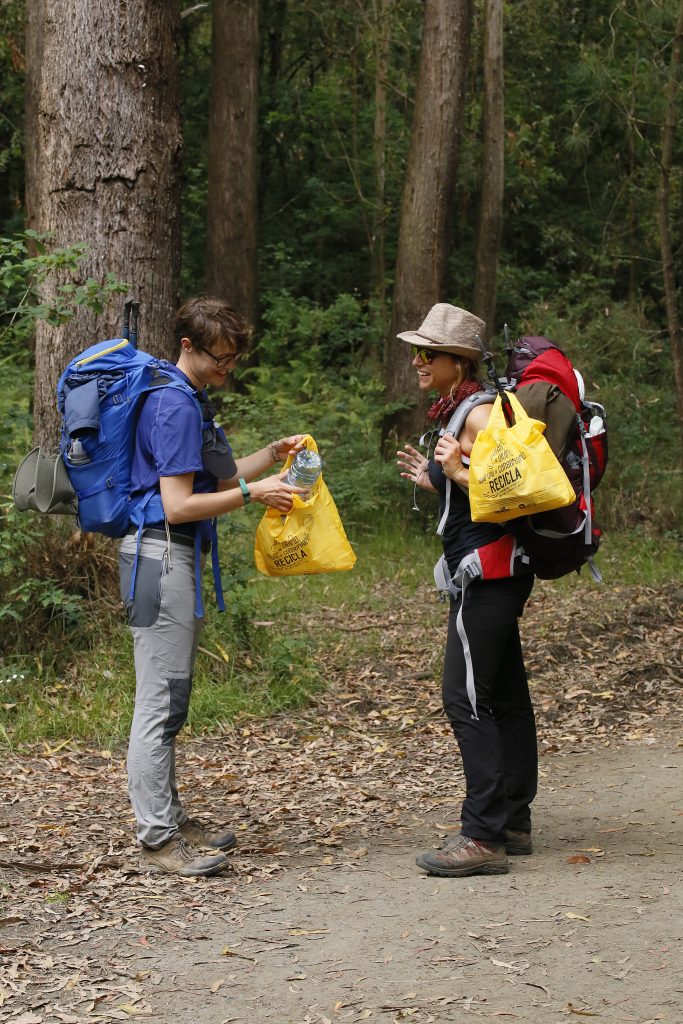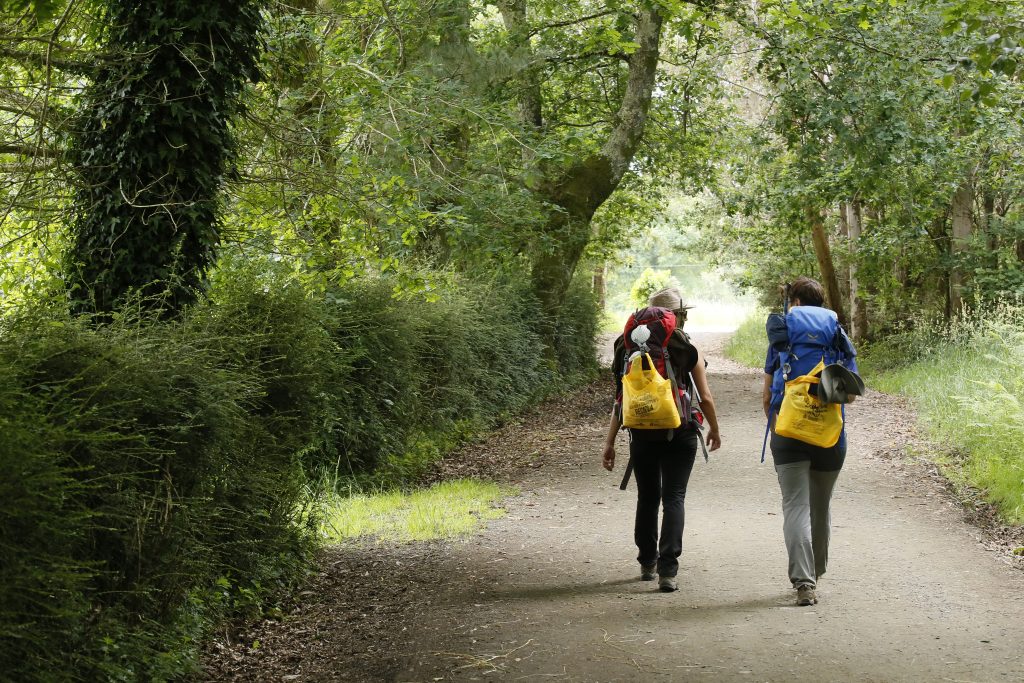El Camino del Reciclaje (The Recycling Way) is an environmental project led by Ecoembes, a non-profit environmental organisation which coordinates packaging recycling projects in Spain in an attempt to highlight the importance of protecting our natural surroundings.
The project is devised to encourage the thousands of pilgrims who walk the Camino de Santiago (Way of Saint James) each year to separate and recycle the various packaging that they use and subsequently dispose of during each stage, helping to keep the Camino litter-free (by reducing the amount of human-generated waste that is needlessly thrown on the ground). This approach, while always recommended, becomes even more important along this route, which passes through areas of unparalleled natural beauty.
The initiative was launched in 2015, aiming to raise awareness of the importance of environmental protection amongst the thousands of pilgrims who walk the Way of Saint James every year. It was devised to encourage recycling along the route, promoting the ecological conservation of the litter-free route in certain key areas:
Objectives for 2019
The ninth edition of the programme seeks to encourage all involved parties to channel their efforts into ensuring that the next Compostela Holy Year, due to fall in 2021, will mark the beginning of the most sustainable, environmentally-friendly and recycling-conscious period in the history of the Way of Saint James.
The campaign, launched by Ecoembes in collaboration with the Galicia Regional Government, is due to extend to the English Way this year, helping to protect the natural environment along the Way of Saint James by providing pilgrims with tools that make it easier for them to recycle. This, in turn, is hoped to deter them from littering.
The initiative is currently supported by 453 different hostels, which can be consulted on the Camino del Reciclaje website.
Eco Pilgrims
One of the most notable new features of this edition is the EcoPilgrim Compostela, which aims to give visibility to the pilgrim’s commitment to recycling. And what better prize could exist than working to preserve the environment, ensuring that pilgrims can continue enjoying these unbeatable locations for many years to come? For each person who uploads a photo of their Eco Pilgrim Compostela bearing at least three stamps (given by hostels participating in the Camino Reciclaje programme between June and October) along with the #EcoPeregrino hashtag on Instagram or Twitter, one indigenous tree will be planted in the Galician forests flanking the Way of Saint James.

Eco hostels: main participants in the project
The central element of the Recycling Way campaign are the hostels, where pilgrims are given tools that make it easier for them to recycle and deter them from littering. In Galicia, there are currently 222 participating eco hostels.
There are a total of 453 participating eco hostels throughout Spain, adding the hostels in Castile and León, Galicia, Cantabria and La Rioja to the above figure, where the project is also being implemented. Not only has the campaign extended to hostels along the English Way in Galicia, but hostels have also adopted it along the Northern Way and the Lebaniego Way in Cantabria this year.
Innovation is also found along the Way of Saint James
Innovation is one of the key pillars of Ecoembes’ operations, allowing for continued progress to be made in the field of recycling in Spain. It will play a special role in this year’s Recycling Way, with pilgrims being introduced to a very special walking buddy: A.I.R-e, the recycling robot This pilgrim robot is already live on the Recycling Way website, helping to answer any recycling-based questions that Eco Pilgrims may have during their trip.
Eco hostels equipment
One of the aims of the Recycling Way campaign is to help volunteer hosts make their hostels sustainable. To do this, they will be given a kit containing various materials along with instruction sheets explaining the campaign in detail.
All participating volunteer hosts have also been given, on average, 2-4 yellow recycling bins used for the disposal of plastic packaging, cans and tins; and blue recycling bins, used for the disposal of paper and card waste. They also come with support material, used to help answer any doubts of Eco Pilgrims when they dispose of their waste. This is all thanks to A.I-R-e, the recycling robot.
The Galicia Regional Government is also helping by placing recycling bins as close as possible to each of the hostels.
To help compile data about the number of kilograms recycled and to count the number of times the recycling bins are emptied on a weekly basis, each eco hostel will be given a calendar including eco-tips and key environmental dates. They will also be given stickers bearing eco-tips, such as “Turn off the light and turn on your eco-side”, “Turn off the tap to avoid wasting water” and “Make the Camino circular. Reduce, reuse and recycle”, encouraging Eco Pilgrims to adopt this approach in their everyday lives.
A mysterious pilgrim will visit all participating hostels to see how these materials are being used.
Ecoembes will then award a sustainability award to the hostel that has best demonstrated its commitment to the values of the Recycling Way, proving itself to be an authentic Eco hostel.
“The Recycling Way” in 2018 The results
Last year, the initiative yielded fantastic results.
- Eco hostels: the collaboration of hostels is crucial in allowing pilgrims to recycle problem-free, giving new life to the waste generated during the stage. Thanks to participation in the Recycling Way campaign in 2018, 248 tonnes of packaging were recycled (28% more than in 2017). To break this figure down, pilgrims disposed of 68,759kg of recyclable waste in yellow bins and 179,335kg in blue bins.
- To make the initiative even more sustainable, we also encourage volunteer hosts to get further involved in the project by promoting recycling and fitting recycling bins in their hostels. In 2018, there were a total of 403 certified eco hostels participating in the Recycling Way. This year, we have already secured the participation of 453 eco hostels.







